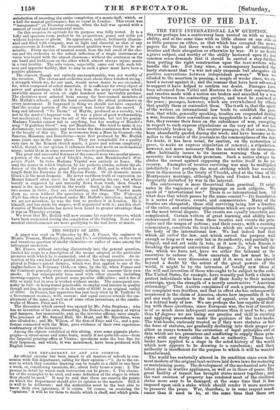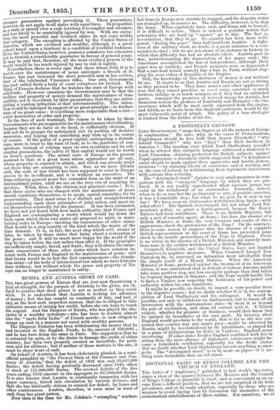TOPICS OF THE DAY.
THE TRUE INTERNATIONAL TAW QUESTION. SELDOM perhaps has a controversy been carried on with so ranch ability, and at the same time with so little chance on one side or so little purpose on either, as that which has occupied the news- papers for the last three weeks on the topics of international treaties and their abrogation or otherwise by war. It is no doubt a grave subject, and worthy of the ability bestowed upon it; but common sense demands that it should be carried a step further than putting the right construction upon the text-writers who handle the law. Not long since a contemporary hazarded the hasty statement that "a war not only suspends but abrogates all positive conventions between independent powers." When we alluded to the assertion in passing, a couple of weeks since, we en- tered a caveat against it ; and the reasons that have been advanced to support it have helped to confirm our doubt. Passages have been advanced from Vattel and Martens to show that conventions and treaties made with a nation are broken and annulled by a war arising between the contracting parties, and must be renewed at the peace ; passages, however, which are overwhelmed by others that qualify them or contradict them. The truth is, that the spirit of the writers on international law tends to establish the posi- tion, that while, generally speaking, treaties are suspended during a war, because their conventions are inapplicable to a state of war- fare, they resume their force on the subsidence of war, excepting in respect to such express stipulations as the very act of war has irretrievably broken up. The counter passages, in that sense, have been abundantly quoted during the week, and have become as fa- miliar to the reader of the journals as the commonplaces of the day. No doubt, it has been usual, for caution, on the restoration of peace, to make an express stipulation of renewal ; a stipulation, however, not more necessary than the notice which an insurance. officehabitually issues to its insurers warning them of the necessity for renewing their premium. Such a notice always in- cludes the caveat against supposing the notice itself to be ne- cessary. Examples of treaties surviving war may be multiplied indefinitely ; but perhaps the most striking which has recently been in discussion is the treaty of Utrecht, cited at the time of the Montpensier marriage although Spain and France had been so frequently disturbed by war in the interval. The controversy is more theoretical than practical. It origi- nates in the vagueness of our language on such subjects. We speak of "international law." There is no international law. Of what does that which passes by the name consist P--Its foundation is a series of treaties, events, and commentaries. Many of the treaties are abrogated ; those still surviving being but a fraction of the entire' and containing stipulations which are open to quibble on the most trivial dispute. The events are equally uncertain and complicated. Certain writers of great learning and ability have endeavoured to extract from these treaties and events the prin- ciples and the usages of nations ; and their essays, with a running commentary, constitute the text-books which are said to expound the body of the international law. We had indeed had that which all called the law, and which served the purpose well enough so long as it was only lax in its authority, and partially in- fringed, and not set aside in toto, as it now is, when Russia is breaking the general convention of Europe. Nor, if we had the law, which we have not, have we either the tribunal or the executive to enforce it. How uncertain the law must be, is proved by this very discussion ; and if it were not also placed beyond a doubt by the action of the great powers of the world, it might be by the intrusion of totally new ideas at the will and invention of those who ought to be subject to the code. The United States, for example, have recently put forth a claim to protect individuals who have cast off their fealty to their natural sovereign, von the strength of a merely constructive American citizenship.' That Austria complained of such a pretension, that her complaint was fruitless, and that in effect she has subsequently acquiesced in the claim of America, shows how impossible it is to put any such question to the test of appeal, even in appealing to a textual body of law. We are perhaps the less capable of deal- ing with these questions, since European war, the test of treaties, is of so much more infrequent occurrence than it used to be ; and thus bft degrees we are losing our practice and skill in creating and applying precedents under the guidance of the text-books. The text-books, curiously treated as if they were statutes or had the force of statutes, are gradually declining into their proper po- sition as essays towards the extraction of legal principles out of data which are too precarious and conflicting to supply those prin- ciples with any fixity either in fact or authority. These text- books have applied to a stage in the acted history of the world which now appears to be drawing to a conclusion; and their authority is insufficient for the purpose to which it will be wanted henceforward.
The world has materially altered in its condition since even the most modern of the original text-writers laid down laws for restoring or maintaining peace. The development of the mechanical arts has taken place in warlike appliances, as well as in those of peace. The great facility of transit has brought states nearer together ; and the vast creation of property has rendered most of the civilized states more easy to be damaged, at the same time that it has imposed upon each a stake which should render it more anxious to preserve the peace. War, therefore, is in some respect inn& easier than it used to be, at the same time that there are
stranger guarantees against provoking it. These guarantees, however, do not apply to all states with equal force. In proportion as a state is spread over a rude territory it is rougher and stronger, and less likely to be essentially injured by war. With one excep- tion, the most powerful and civilized states do not come within that category. The exception is afforded by the United States of America, which are civilized and wealthy, although to a great extent based upon a territory in a condition of youthful rudeness. Even the United States, however, possess a commerce too extensive not to furnish a considerable guarantee in favour of general peace. It may be said that, therefore, all the most civilized powers of the world would be too much injured by war to risk it lightly.
Nevertheless, there is every sign that those whose duty it is to watch over the maintenance of peace anticipate a breach of it. France has just increased the most powerful arm in her service, that of the celebrated Vincennes rifles. Our own Government has just called forth a body of coast volunteers for Ireland. The King of Prussia declares that he watches the state of Europe with solicitude. However conscious the Governments may be that the welfare and property of society demand the maintenance of tran- quillity, yet it is evident, by their precautions, that they are antici- pating a wanton infraction of that internationality. This infrac- tion would be indulged in support of no great principle—in further- ance of no great cause : it is nothing more respectable than a riot— a riot destructive of order and property.
In the face of such warnings, the course to be taken by those Governments who are responsible for the maintenance of civilization, because they are de facto at its head, is sufficiently obvious. It will not do to prepare for anticipated riot by putting off decisive measures, and hoping that something may turn up in the course of events. If the police of a great capital, anticipating a disturb- ance, were to trust to the turn of luck, or to the penitence of con- spirators, instead of relying upon its own resolution and its sub- stantial precautions, the safety of that capital would not be worth an hour's purchase. The actual state of Europe at the present moment is that of a great town whose approaches are all easy, whose property is exposed to attack, and which can already point out those who are conspiring to riot. But, as we have already said, the code of law which has been supposed to exist in Europe proves to be insufficient, and it is without an executive. The long-enduring general peace has concealed from us the want of an international police, until we are on the very eve of requiring its services. What, then, is the obvious and practical course ? It is, that those states who are charged with the maintenance of peace should constitute themselves, so to speak, special constables for its preservation. They must come to a distinct and straightforward understanding upon their principles of joint action, and must en- rol themselves avowedly for the purpose. It has been intimated, we have not yet heard with how much authority, that France and England are contemplating a treaty which would lay down the basis upon which those two states are prepared to unite in main- taining order in Europe—inviting the conourrence of other states. That would be a step exactly of the kind which the wants of the time demand. It is, in fact, the next step which will, sooner or later, be taken by those states that bring about a restoration of the peace ; and it will be much more happy for the world if the step be taken before the riot rather than after it. If the principles are sufficiently simple, broad, and frank, they will obtain the imme- diate concurrence of those other states which have common in- terest with France and England in the maintenance of peace ; and that treaty would be in fact the first commencement—the founda- tion-stone—of the body of international law which we have hitherto done without, but without which the peace and property of Eu- rope can no longer be maintained in safety.





































 Previous page
Previous page